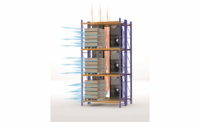Tippmann Innovation (Ti) and Georgia Tech are coining a new term, 'Cold PI.' Ti in partnership with Georgia Tech and their Supply Chain and Logistics Institute and the Physical Internet Center is rethinking the cold food chain and their logistic systems so it can behave as a physical Internet. The Cold PI or the Cold Food Physical Internet is an area of study identified and developed by Georgia Tech's professor Benoit Montreuil. Nick Pacitti of Ti and David Sterling of Savills Studley will combine their 70 years of experience in working with the Georgia Tech team and several industry participants.
The cold food chain is currently long, complex and highly fragmented. It is fraught with delays, distortions, differences and disputes. According to the Food and Agricultural Organization of the United Nations (FAO), up to a third of products arrive at final destination either compromised or adulterated, result of an improperly functioning cold food chain.
Cold PI is designed for achieving order-of-magnitude improvement of its efficiency, sustainability and resilience. Simply stated, improving the cold food chain has huge benefits in reducing food waste and costs, minimizing logistics inefficiencies and greenhouse gas emissions, while shrinking social infrastructure costs.
The industry wide Cold PI initiative will address these challenges by leapfrogging decades of innovation in other supply chain sectors, and exploiting the recently introduced paradigm-changing Physical Internet model or Cold PI into the cold food chain industry. Cold PI will require companies to drop their emphasis on optimizing the use of existing assets. Instead, the goal needs to be optimizing more efficient delivery of products, using available assets regardless of who owns them.
Much of this is being driven as companies are racing to shed assets that do not add the value they once did. In addition, we are seeing first-hand how competitors are also collaborating with each other to become more efficient. The concept of 'coopetition' is becoming more accepted, as it has dramatic benefits in reducing cost, miles and carbon footprint, to name a few.
As a leader in the cold food space, Ti does more than design and build refrigerated facilities. We provide end-to-end solutions that are leading the way for companies of all sizes to become more resilient, efficient and socially responsible. Due to the critical nature of the cold food chain and its vulnerability we have joined forces with our alliance partner Leo A Daly/LAN, a world renowned engineering firm in designing and building hurricane resistant refrigerated food distribution centers. These state-of-the-art facilities can resist hurricane force winds and rains without service disruption to their stores and their customers. Just as important, these distribution centers act as command centers in assuring near normal and safe operations throughout these types of natural disasters.
For more information, visit https://www.ticold.com/






